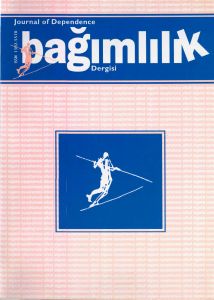Alkol bağımlılığında kişilik özellikleri
Anahtar Kelimeler:
Alkol bağımlılığı- kişilik- kendilikÖz
Alkol bağımlılarına özgü bir kişilik olmamakla birlikte, ortak kişilik özelliklerinden ve psikodinamik etmenlerden söz edilebilir. Ego zayıflığı, kendilik değerini sürdürememek gibi yapısal eksiklikler, kendine bakım kapasitesindeki yetersizlik üzerinde durulmuştur. Süperego, zihnin alkolde çözünebilen kısmı olarak tanımlanmaktadır. Alkol kullanımı kişide güç hissine ve kendilik değerinin artışına neden olmaktadır. Kişilik özellikleri de dikkate alınarak alkolizm tipleri tanımlanmıştır. Cloninger tarafından tanımlanan Tip 1 alkolizmde kişilik özellikleri; düşük düzeyde yenilik arayışı, yüksek düzeyde zarardan kaçınma ve ödül bağımlılığıdır. Tip 2 alkolizmde ise kişilik özellikleri olarak yüksek derecede yenilik arayışı, düşük düzeyde zarardan kaçınma ve ödül bağımlılığı daha az görüldüğü belirtilmiştir. Tip 2 alkol bağımlılarında agresif davranışlar, suça eğilim Tip Ve göre daha çok görülmektedir. Daha dışa dönüktürler, impulsif davranış, heyecan ve macera arayışı daha fazladır. Günümüzde tüm psikiyatrik hastalıklarda biyolojik yaklaşım ve tedavi ön plana çıkarken, alkol bağımlılığında kişilik özellikleri tedavi süreci ve prognozda etkili olması nedeniyle önemlidir.
Referanslar
Kaufman E. Psychotherapy of Addicted Persons. 1. Baskı, New York: Guilford Press, 1994: 1-29.
Levin JD. Psychodynamic treatment of alcohol abuse. Barber JP, Crits-Christoph P (editors), Dynamic Therapies for Psychiatric Disorders (Axis I). 1. Baskı, New York: Basic Books, 1995: 193-229.
Abraham K. The psychological relations between sexuality and alcoholism. Jones E (editor) Selected Papers of Karl Abraham. 5. Baskı, London: Hogarth Press, 1954: 80-89.
Fenichel O. The Psychoanalytic Theory of Neurosis. New York: Norton, 1945, 375386.
Gabbard GO. Psychodynamic Psychiatry in Clinical Practice. 2. Baskı, Washington, DC: American Psychiatric Press, 1994: 359-394.
Khantzian EJ. The injured self, addiction, and our call to medicine. Understanding and managing addicted physicians. JAMA 1985; 254: 249-251.
Bohn MJ, Meyer RE. Textbook of Substance Abuse Treatment. Galanter M, Kleber HD (editors). 1. Baskı, Washington, DC: American Psychiatric Press, 1994, 11-24.
Schuckit MA, Irwin M, Mahler HIM. Tri-dimentional Personality Questionnaire scores of sons of alcoholic and nonalcoholic fathers. Am J Psychiatry 1990;147: 481-487.
Schuckit MA, Klein J, Twitchell G, Smith T. Personality test scores as predictors of alcoholism almost a decade later. Am J Psychiatry 1994; 151:1038-1042.
Schuckit MA. Alcohol Related Disorders. Comprehensive Textbook of Psychiatry. Saddock BJ, Sadock VA (editors) 7. Baskı, Philadelphia: Lippincott Williams&Wilkins, 2000: 953-971.
Lappalainen J, Long JC, Eggert M, et al. Linkage of antisocial alcoholism to the serotonin 5-HT1B receptor gene in two populations. Arch Gen Psychiatry 1998; 55: 989-994.
İndir
Yayınlanmış
Sayı
Bölüm
Lisans
Telif Hakkı (c) 2025 Bağımlılık Dergisi

Bu çalışma Creative Commons Attribution-NonCommercial-NoDerivatives 4.0 International License ile lisanslanmıştır.
Dergimiz ve bu internet sitesinin tüm içeriği Creative Commons Atıf-GayriTicari-Türetilemez 4.0 Uluslararası (CC BY-NC-ND 4.0) lisansının şartları ile ruhsatlandırılmıştır. Bu durum, Budapeşte açık erişim girişiminin (BOAI) açık erişim tanımı ile uyumludur. Creative Commons Atıf-GayriTicari-Türetilemez Lisansı, kullanıcıların bir makaleyi kopyalamasına, değiştirmeden dağıtmasına ve nakletmesine ve makalenin ticari olmayan mahiyette kullanılmasına imkan tanımaktadır. CC BY-NC-ND 4.0 lisansı, yazarına uygun şekilde atfedildiği sürece açık erişimli bir makalenin ticari olmayan mahiyette kullanılmasına izin vermektedir.

